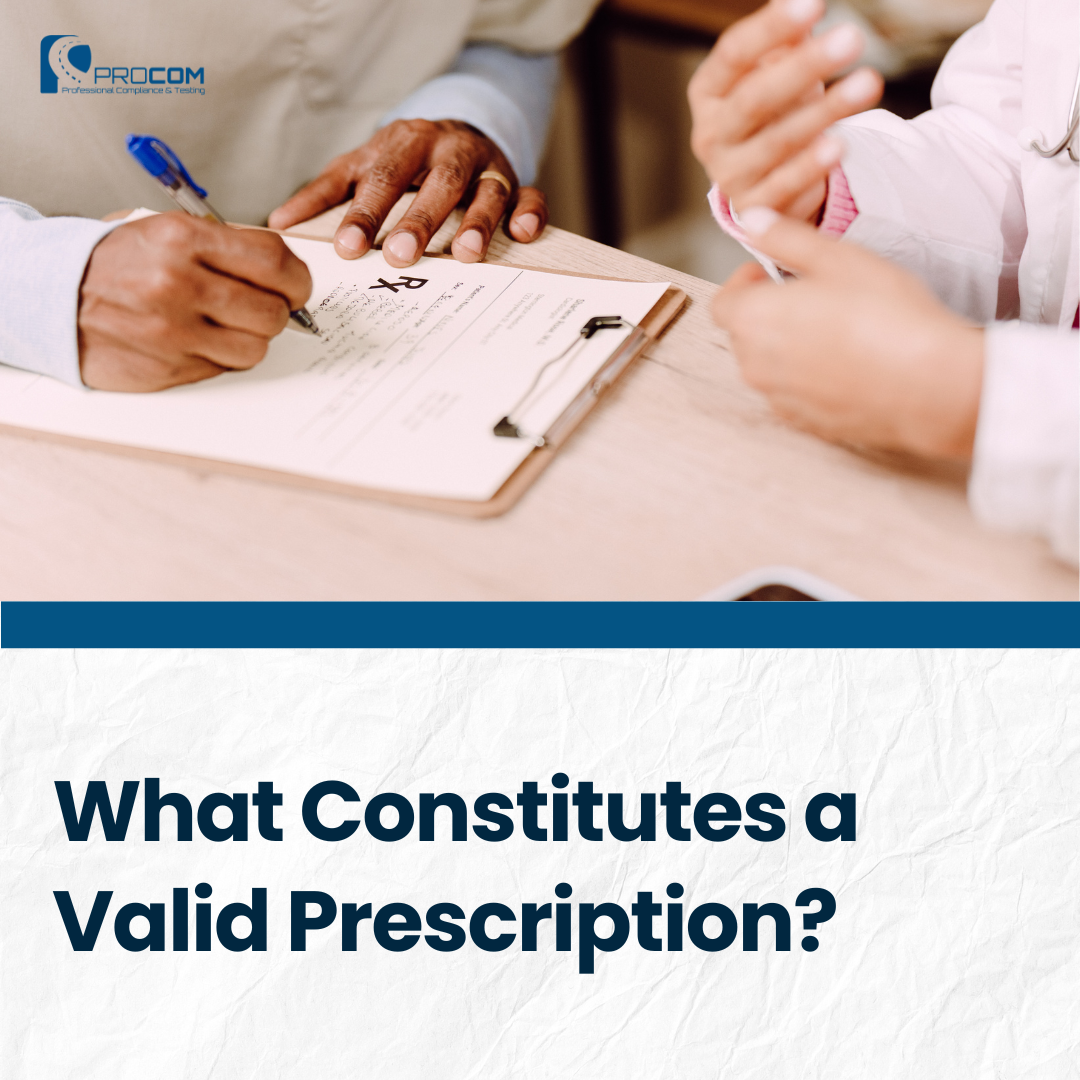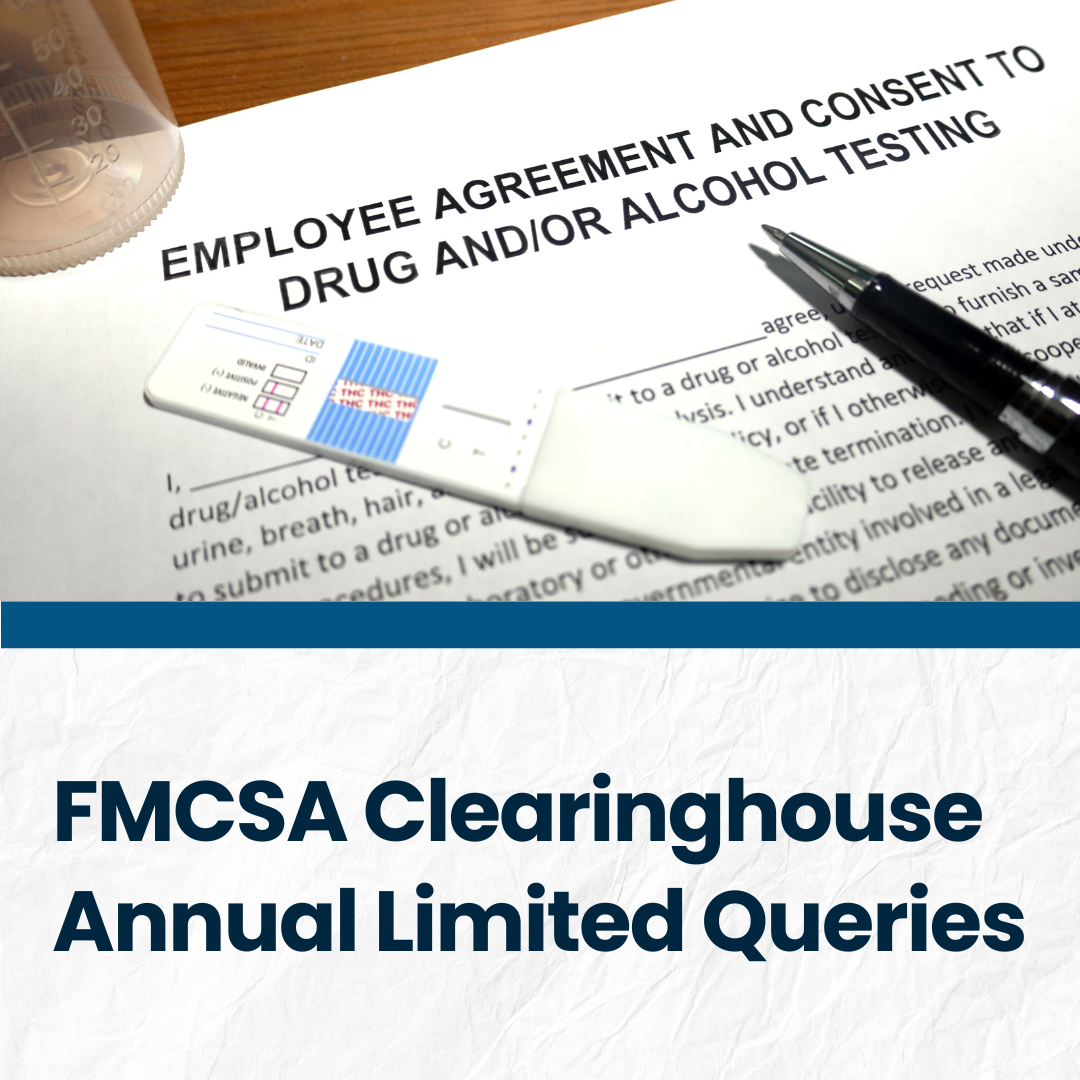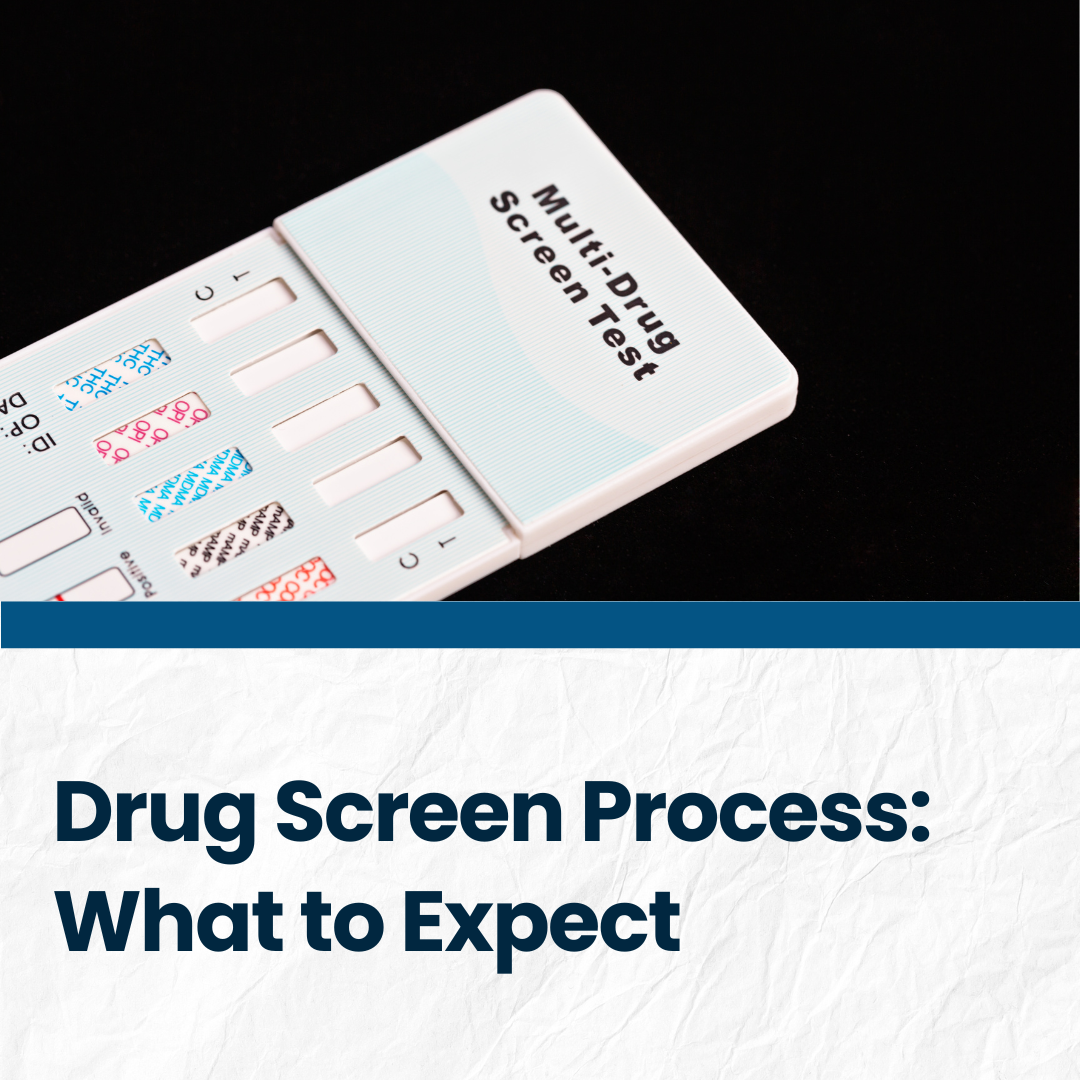A valid prescription is a written, electronic, or verbal order issued by a licensed healthcare provider authorizing a patient to receive a specific medication. For a prescription to be legally recognized, it must include specific components that verify the prescriber’s authority, the patient’s identity, and the medical necessity of the drug.
In the context of workplace drug testing, understanding what constitutes a valid prescription becomes critical. When an employee tests positive for a controlled substance, the prescription definition in pharmacy and regulatory terms determines whether the result is reported to the employer as positive or negative.
The 10 Components of a Valid Prescription
For a prescription to be valid under federal and state pharmacy laws, it must contain these essential elements:
- Date the prescription was written
- Patient’s full name
- Patient’s address
- Drug name and strength
- Dosage form (tablet, capsule, liquid, etc.)
- Quantity to be dispensed
- Directions for use (sig)
- Number of refills authorized
- Prescriber’s name, address, and phone number
- Prescriber’s signature (handwritten for Schedule II drugs, or electronic for e-prescriptions)
A prescription written in code or lacking any of these components may be considered invalid and cannot be legally dispensed. More importantly for drug testing purposes, an incomplete prescription may not satisfy the requirements of a Medical Review Officer (MRO) when verifying whether a positive test result has a legitimate medical explanation.
How Prescription Verification Works in Drug Testing
PROCOM does not define what constitutes a valid prescription. That responsibility falls to the Medical Review Officer, an independent licensed physician who reviews all non-negative drug test results. The MRO serves as an impartial evaluator and advocate for the accuracy of the drug testing process.
When laboratory results indicate a positive finding, the MRO contacts the donor (the person who was tested) to conduct a verification interview. During this interview, the donor has the opportunity to provide documentation proving they have a valid prescription for the detected substance.
For a prescription to satisfy MRO review, it must meet three criteria:
The prescription must be for the exact substance detected. A prescription for hydrocodone does not explain a positive result for oxycodone, even though both are opioids. The medication must match the specific drug or metabolite identified by the laboratory.
The prescription must be current and not expired. A prescription from two years ago, even if it was valid at the time, does not justify a current positive result. The donor must demonstrate ongoing medical treatment at the time of the test.
The prescription must be in the donor’s name. Medications prescribed to a spouse, family member, or friend do not constitute a valid defense for a positive drug test.
Common Examples of Invalid Prescriptions in Drug Testing
Over years of administering drug testing programs for employers across Colorado and nationwide, PROCOM has observed several recurring situations in which donors attempt to explain positive results with documentation that does not meet MRO standards.
Medical Marijuana Cards
This is the most common misconception. Medical marijuana cards, sometimes called “green cards,” are authorized at the state level but are not recognized as valid prescriptions under federal law. The Department of Transportation explicitly states that medical marijuana use is not a legitimate medical explanation for a marijuana-positive drug test. For DOT-regulated drug testing, there is no exception for state-legal marijuana programs.
The same applies to non-DOT workplace testing in most cases. Even in states like Colorado, where recreational marijuana is legal, employers maintain the right to enforce drug-free workplace policies. A medical marijuana card does not override company policy or protect an employee from adverse action following a positive test.
Prescriptions for the Wrong Substance
A donor tests positive for multiple opioids but can only produce a valid prescription for one. For example, they have a current prescription for tramadol, but the test also detected hydrocodone. The MRO can only verify the positive result as medically explained for the substance that matches the prescription.
Expired Prescriptions
A donor presents a prescription that was valid years ago but has since expired. Old prescriptions, even if they were legitimate at the time of issue, do not explain current drug use. The MRO must verify that the donor was under active medical treatment at the time of collection.
The MRO Verification Process and Timeline
Once the laboratory reports a non-negative result, the MRO contacts the donor. This is where employers sometimes encounter delays.
Many donors who cannot provide legitimate medical documentation become difficult to reach. They may avoid phone calls, fail to respond to messages, or simply disappear when they know they cannot justify the test result. This avoidance leads to extended turnaround times that frustrate employers waiting for final results.
PROCOM recommends that employers get involved early when contact issues arise. If the MRO or TPA (Third-Party Administrator) reports difficulty reaching a donor, employer intervention often accelerates the process. A direct conversation with the employee about the importance of completing the verification process typically produces results faster than continued attempts by the MRO’s office.
Federal regulations establish clear timelines for this process. Once the MRO successfully contacts the donor, the donor has 10 calendar days to provide documentation supporting their claim of a valid prescription. If the donor fails to provide adequate documentation within this window, the MRO reports the result as verified positive.
DOT vs. Non-DOT Testing: Prescription Verification Standards
One question employers frequently ask is whether the standards for prescription verification differ between DOT and non-DOT testing programs. The answer is straightforward: the MRO applies the same criteria across all testing categories.
For both DOT drug testing and non-DOT programs, the MRO evaluates whether the prescription is current, specific to the detected substance, and issued to the donor being tested. The regulatory framework (49 CFR Part 40 for DOT) codifies these standards, but they represent sound medical and legal practice that applies universally.
The primary difference lies in consequences, not verification standards. DOT-positive results trigger specific regulatory actions, including removal from safety-sensitive functions and mandatory return-to-duty processes. Non-DOT positives are subject to the employer’s disciplinary procedures established under its drug-free workplace policy.
Employer Responsibilities and Best Practices
While prescription verification is the MRO’s responsibility, employers play an important role in the process.
Establish clear policies. Your drug-free workplace policy should explain that employees may be asked to verify prescriptions following a positive test. Some employers require advance disclosure of prescription medications to HR or occupational health. Whatever approach you choose, document it and apply it consistently.
Respond quickly to contact requests. When your TPA or MRO reports difficulty reaching a donor, act promptly. Contact the employee directly and emphasize that completing the verification process is required. Delays hurt everyone.
Understand your limits. Employers should not ask donors directly about their prescriptions or medical conditions. That inquiry belongs to the MRO. Your role is to facilitate the process, not conduct medical interviews.
Train your supervisors. Supervisors involved in reasonable suspicion determinations or post-accident decisions should understand that a claimed prescription does not exempt testing. The employee gets tested; the MRO sorts out the prescription question afterward. For supervisor training resources, contact PROCOM to learn about our DER and supervisor training programs.
Protecting Your Workplace While Respecting Employee Rights
The prescription verification process exists to balance competing interests. Employers deserve accurate information about whether employees are using controlled substances that could affect workplace safety. Employees deserve the opportunity to demonstrate that their medication use is legitimate and medically supervised.
Prescription disclosure policies for safety-sensitive roles:
Many employers include a policy clause requiring employees to report prescriptions that may influence their ability to perform their job safely. This is not a blanket requirement to disclose all medications (which would raise privacy concerns and create unnecessary information sharing). Instead, it addresses specific conflicts between medication restrictions and job duties.
For example, if an employee receives a prescription with instructions stating “do not operate heavy machinery while taking this medication,” and their job description is to operate heavy machinery, the employee must self-report this conflict to their supervisor or HR before performing any safety-sensitive functions. This allows the employer to make temporary work adjustments, provide alternative assignments, or determine whether the employee can safely perform their duties while under medical treatment.
This policy protects both the employee and the employer. It prevents situations in which an employee works under the influence of impairing medications without the employer’s knowledge, and it provides employees with a clear process for addressing legitimate medical needs without risking their employment.
When these systems work properly, employees with valid prescriptions are protected from false accusations, while employers receive reliable results they can act upon with confidence. The MRO serves as the neutral arbiter who applies consistent medical and regulatory standards to every case.
If you have questions about prescription verification, drug testing procedures, or compliance requirements for your industry, PROCOM’s team is ready to help. With over 25 years of experience administering drug and alcohol testing programs for employers across Colorado and nationwide, we understand both the regulatory requirements and the practical challenges you face.
Contact PROCOM today to discuss your drug testing program needs or to learn more about our comprehensive testing services.
Related services: Medical Review Officer (MRO) Services | DOT Drug and Alcohol Testing | Non-DOT Screening | View All Services
Legal Disclaimer: The information provided in this guide is for educational purposes only and does not constitute medical, legal, or professional advice. Prescription verification standards and drug testing procedures are governed by federal and state pharmacy laws, medical practice standards, and DOT regulations (49 CFR Part 40, where applicable).




